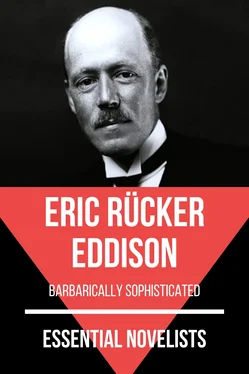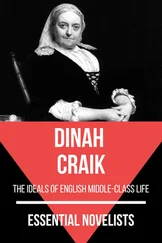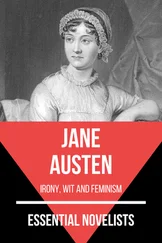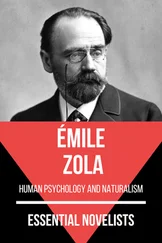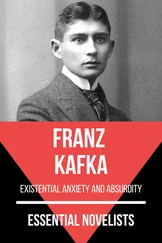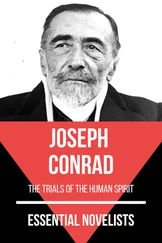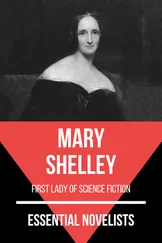“’Tis so,” said Corund. “When did I charge thee with wisdom and sober judgement? With treachery I know thou art soaked wet.”
“And thou art my friend!” said Gro.
Corund said in a while, “I have long known thee to be both a subtle and dissembling fox, and now I durst trust thee no more, for fear I should fall further into thy danger. I am resolved to murther thee.”
Gro fell back in his chair and flung out his arms. “I have been here before,” he said. “I have beheld it, in moonlight and in the barren glare of day, in fair weather and in hail and snow, with the great winds charging over the wastes. And I knew it was accursed. From Morna Moruna, ere I was born or thou, O Corund, or any of us, treason and cruelty blacker than night herself had birth, and brought death to their begetter and all his folk. From Morna Moruna bloweth this wind about the waste to blast our love and bring us destruction. Ay, kill me; I’ll not ward myself, not i’ the smallest.”
“’Tis small matter, Goblin,” said Corund, “whether thou shouldst or no. Thou art but a louse between my fingers, to kill or cast away as shall seem me good.”
“I was King Gaslark’s man,” said Gro, as if talking in a dream; “and between a man and a boy near fifteen years I served him true and costly. Yet it was my fortune in all that time and at the ending thereof only to get a beard on my chin and remorse at heart. To what scorned purpose must I plot against him? Pity of Witchland, of Witchland sliding as then into the pit of adverse luck, ’twas that made force upon me. And I served Witchland well: but fate ever fought o’ the other side. I it was that counselled King Gorice XI. to draw out from the fight at Kartadza. Yet wanton Fortune trod down the scale for Demonland. I prayed him not wrastle with Goldry in the Foliot Isles. Thou didst back me. Nought but rebukes and threats of death gat I therefrom; but because my redes were set at nought, evil fell upon Witchland. I helped our Lord the King when he conjured and made a sending against the Demons. He loved me therefor and upheld me, but great envy was raised up against me in Carcë for that fact. Yet I bare up, for thy friendship and thy lady wife’s were as bright fires to warm me against all the frosts of their ill-will. And now, for love of thee, I fared with thee to Impland. And here by the Moruna where in old days I wandered in danger and in sorrow, it is fitting I behold at length the emptiness of all my days.”
Therewith Gro fell silent a minute, and then began to say: “O Corund, I’ll strip bare my soul to thee before thou kill me. It is most true that until now, sitting before Eshgrar Ogo, it hath been present to my heart how great an advantage we held against the Demons, and the glory of their defence, so little a strength against us so many, and the great glory of their flinging of us back, these things were a splendour to my soul beholding them. Such glamour hath ever shone to me all my life’s days when I behold great men battling still beneath the bludgeonings of adverse fortune that, howsoever they be mine enemies, it lieth not in my virtue to withhold from admiration of them and well nigh love. But never was I false to thee, nor much less ever thought, as thou most unkindly accusest me, to compass thy destruction.”
“Thou dost whine like a woman for thy life,” said Corund. “Cowardly hounds never stirred pity in me.” Yet he moved not, only looking dourly on Gro.
Gro plucked forth his own sword, and pushed it towards Corund hilt-foremost across the board. “Such words are worse than sword-thrusts betwixt us twain,” said he, “Thou shalt see how I’ll welcome death. The King will praise thee, when thou showest the cause. And it will be sweet news to Corinius and them that have held me in their hate, that thy love hath cast me off, and thou hast rid them of me at last.”
But Corund stirred not. After a space, he filled another cup, and drank, and sat on. And Gro sat motionless before him. At last Corund rose heavily from his seat, and pushing Gro’s sword back across the table, “Thou’dst best to bed,” said he. “But the night air’s o’er shrewd for thine ague. Sleep on my couch to-night.”
The day dawned cold and gray, and with the dawn Corund ordered his lines round about Eshgrar Ogo, and sat down for a siege. For ten days he sat before the burg, and nought befell from dawn till night, from night till dawn: only the sentinels walked on the walls and Corund’s folk guarded their lines. On the eleventh day came a bank of fog rolling westward from the Moruna, chill and dank, blotting out the features of the land. Snow fell, and the fog hung on the land, and night came of such a pitchy blackness that even by torch-light a man might not see his hand stretched forth at arm’s length before him. Five days the fog held. On the fifth night, it being the twenty-fourth of November, in the darkness of the third hour after midnight, the alarm was sounded and Corund summoned by a runner from the north with word that a sally was made from Eshgrar Ogo, and the lines bursten through in that quarter, and fighting going forward in the mirk. Corund was scarce harnessed and gotten forth into the night, when a second runner came hot-foot from the south with tidings of a great fight thereaway. All was confounded in the dark, and nought certain, save that the Demons were broken out from Eshgrar Ogo. In a space, as Corund came with his folk to the northern quarter and joined in the fight, came a message from his son Heming that Spitfire and a number with him were broken out at the other side and gotten away westward, and a great band chasing him back towards Outer Impland; and therewith that more than an hundred Demons were surrounded and penned in by the shore of the lakes, and the burg entered and taken by Corund’s folk; but of Juss and Brandoch Daha no certain news, save that they were not of Spitfire’s company, but were with those against whom Corund went in person, having fared forth northaway. So went the battle through the night. Corund himself had sight of Juss, and exchanged shots with him with twirl-spears in a lifting of the fog toward dawn, and a son of his bare witness of Brandoch Daha in that same quarter, and had gotten a great wound from him.
When night was past, and the Witches returned from the pursuit, Corund straitly questioned his officers, and went himself about the battlefield hearing each man’s story and viewing the slain. Those Demons that were hemmed against the lakes had all lost their lives, and some were taken up dead in other parts, and some few alive. These would his officers let slay, but Corund said, “Since I am king in Impland, till that the King receive it of me, it is not this handful of earth-lice shall shake my safety here; and I may well give them their lives, that fought sturdily against us.” So he gave them peace. And he said unto Gro, “Better that for every Demon dead in Ogo Morveo ten should rise up against us, if but Juss only and Brandoch Daha were slain.”
“I’ll be in the tale with thee, if thou wilt proclaim them dead,” said Gro. “And nothing is likelier, if they be gone with but two or three on to the Moruna, than that such a tale should come true ere it were told in Carcë,”
“Pshaw!” said Corund, “to the devil with such false feathers. What’s done shows brave enow without them: Impland conquered, Juss’s army minced to a gallimaufry, himself and Brandoch Daha chased like runaway thralls up on the Moruna. Where if devils tear them, ’tis my best wish come true. If not, thou’lt hear of them, be sure. Dost think these can survive on earth and not raise a racket that shall be heard from hence to Carcë?”
Of the Coming of the Lords of Demonland to Morna Moruna, whence They Beheld the Zimiamvian Mountains, Seen Also by Gro in Years Gone By; and of the Wonders Seen by Them and Perils Undergone and Deeds Done in Their Attempt on Koshtra Pivrarcha, the which Alone of All Earth’s Mountains Looketh Down Upon Koshtra Belorn; and None Shall Ascend up into Koshtra Belorn that Hath Not First Looked Down Upon Her.
Читать дальше
